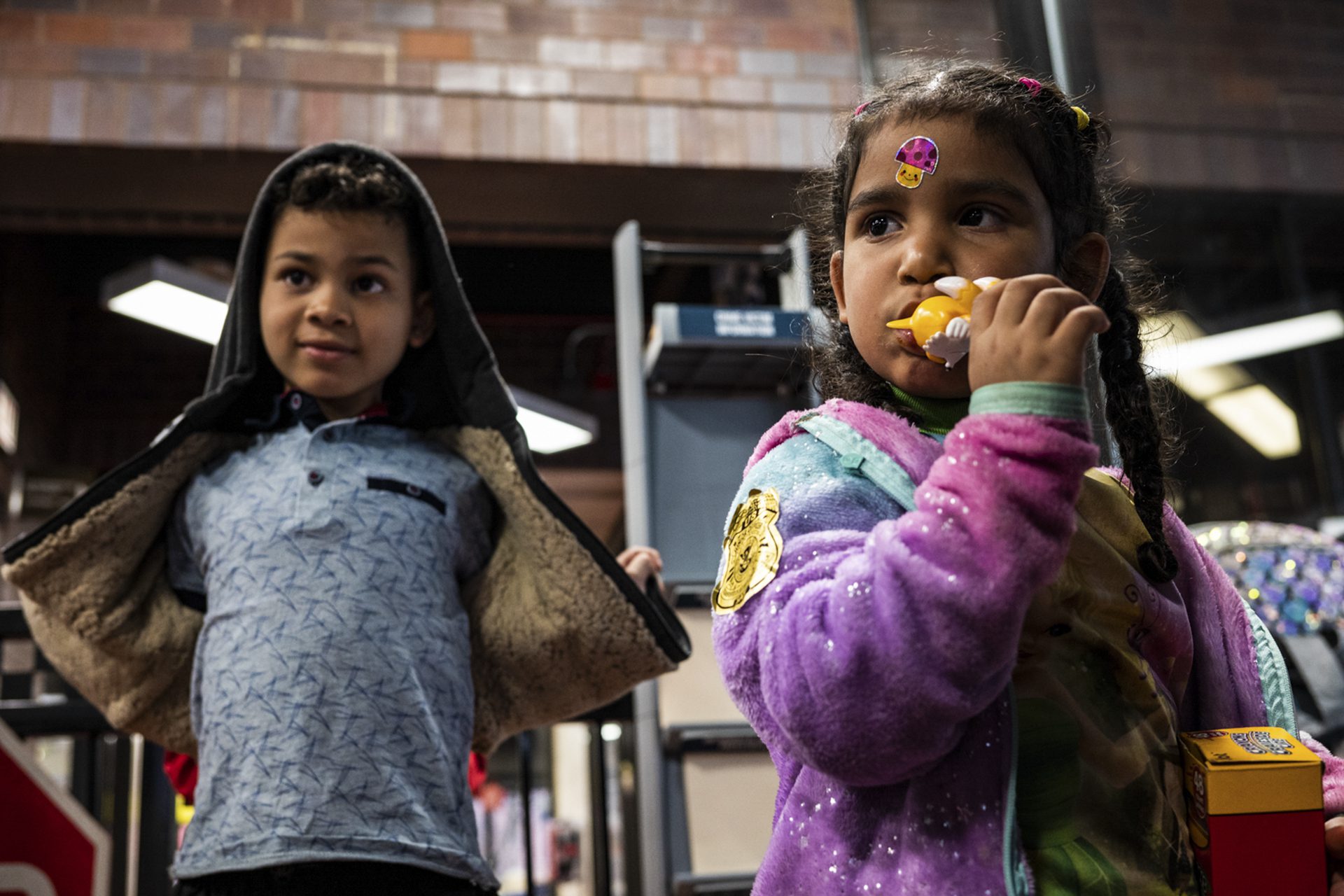 Colin Boyle/Block Club Chicago
Colin Boyle/Block Club ChicagoAround 3,100 migrants are in temporary shelters, relying on donated clothes and food as Mayor-elect Brandon Johnson inherits the crisis. “We don’t have beds. Children are sleeping on the floor,” one man said.
This story was originally published in Block Club Chicago, a nonprofit newsroom focused on Chicago’s neighborhoods. Sign up for its free daily newsletter.
AUSTIN — In her farewell speech Monday, outgoing Chicago Mayor Lori Lightfoot touted her accomplishments during a term marred by a pandemic, civil unrest and a skyrocketing homicide rate.
But she failed to address the escalating crisis the city now faces, which has left migrants without beds and showers living on police station floors as officials scramble to serve the thousands of new people arriving.
Alderpeople and those working on the front lines with migrants say Lightfoot’s team was “woefully unprepared” to tackle the crisis. And Mayor-elect Brandon Johnson, who takes office next week, hasn’t offered up a specific plan, either.
Want to receive stories like this in your inbox every week?
Sign up for our free newsletter.

After an initial wave last fall, large groups of migrants again began to arrive in Chicago a few weeks ago, city officials said. Hundreds are now arriving daily, forcing some to stay in police stations where they’re sleeping on floors and some eating expired food.
At least 8,500 migrants have come to Chicago since August, primarily arriving on buses, although some came via one-way plane tickets. As of Friday, about 3,100 migrants were being housed in temporary shelters, a city spokesperson said.
Many of them came to the United States from Venezuela, which has struggled with political upheaval and an economic crisis resulting in severe food and medicine shortages, surging inflation and rising unemployment and violent crime. More than 7.2 million Venezuelans have fled their country.
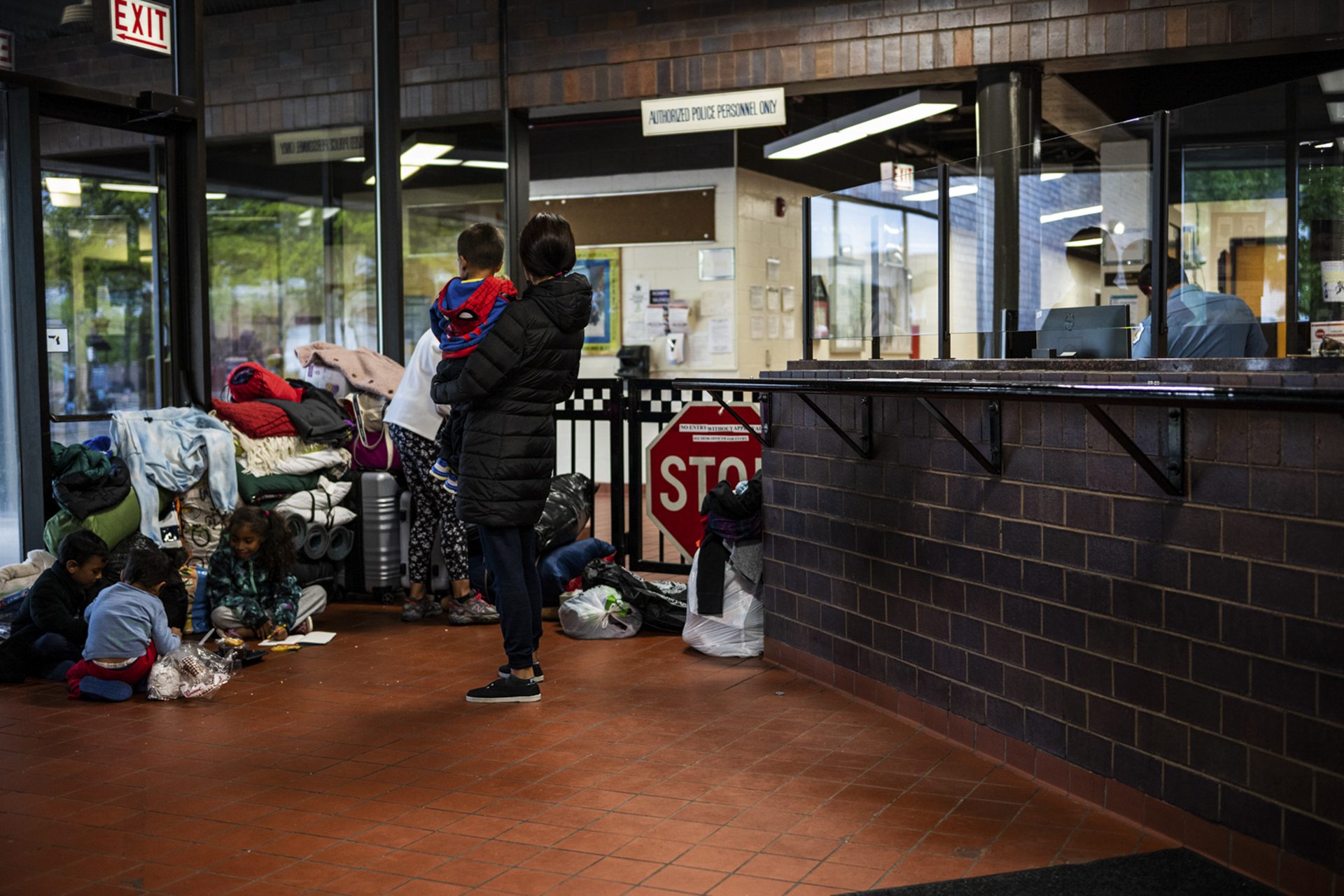
And the crisis isn’t going away. More migrants are expected as Texas Gov. Greg Abbott has said he’ll resume busing people to Democrat-led cities in protest of federal immigration policies, a decision Lightfoot urged him to reconsider in a public letter last month.
This week, alderpeople blasted Chicago’s response, saying migrants are living in “inhumane” conditions due to a series of failures from the country’s immigration system to decisions at the local level.
Johnson will inherit the migrant crisis when he is sworn in Monday. He said last week he’s put together a team to tackle the crisis, but has not released specific details on who is involved or what they are planning.
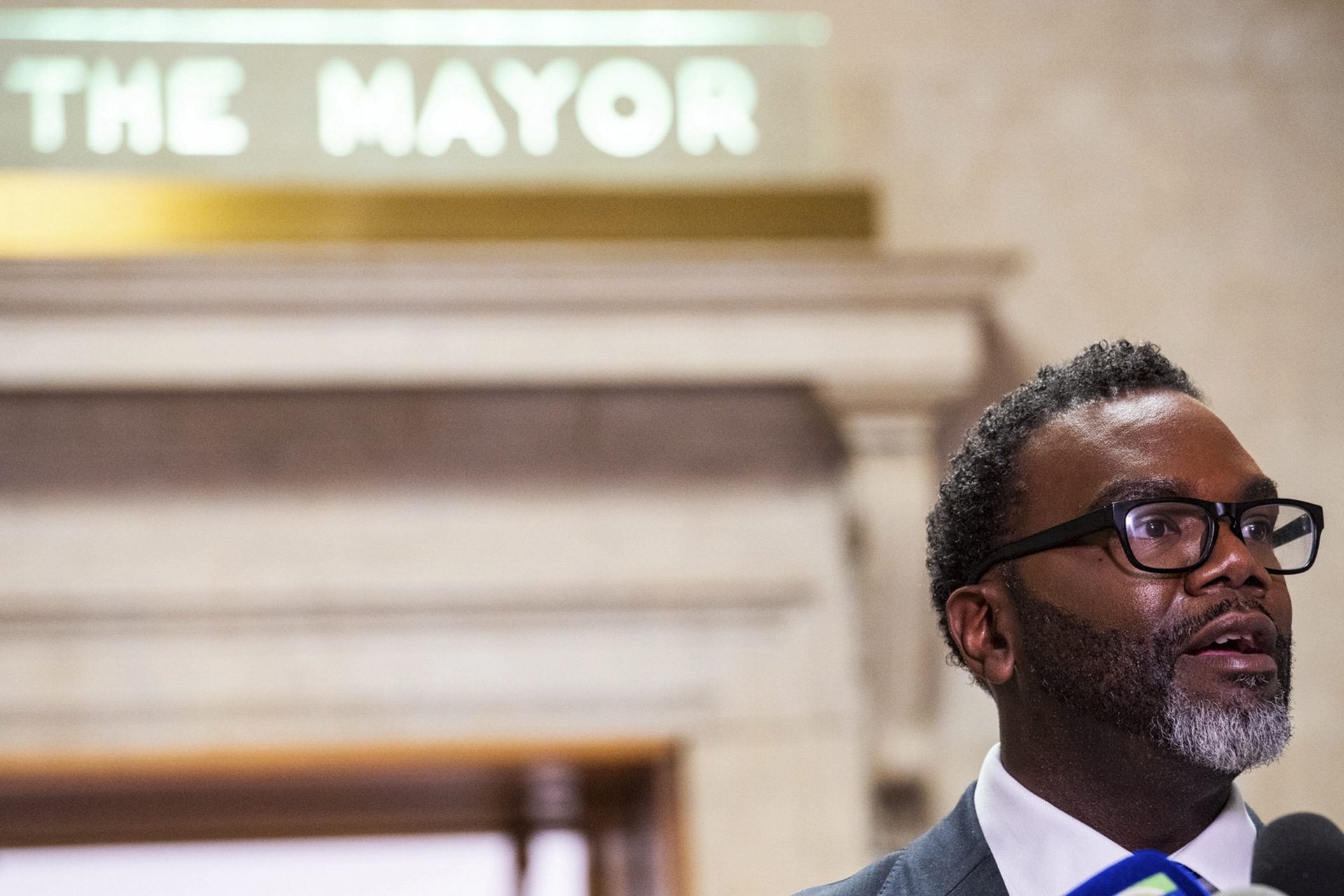
A spokesperson for his campaign declined to comment Monday. But speaking at a high school in Pilsen Friday, Johnson said he was “hesitant” to call the situation a crisis, because that would suggest city leaders or the migrants have “done something wrong.”
“It’s a dynamic that I believe is essential to our democracy, people being able to experience safety and security in a place that has brought people from all over the world. And the political decision of governors along the border to try to stick it to us, and use people as political football is unconscionable,” Johnson said. “I actually find it to be quite wicked and demented.”
During her speech, Lightfoot instead reflected on achievements throughout her term in office, like raising the minimum wage to $15 an hour, her signature Invest South/West initiative and steering the city through the COVID-19 pandemic.
“These challenges push me closer to my faith. And through it all, I believe, made me a better leader, a battle-tested leader to be sure, but I also hope and believe that it made me a better person,” Lightfoot said at the headquarters of West Side violence prevention group BUILD, 5100 W. Harrison St.. “I wrapped myself up in resiliency, the resiliency that I saw over and over again, all across Chicago.”
On Monday, that resiliency was on display among the city’s newest residents, too.
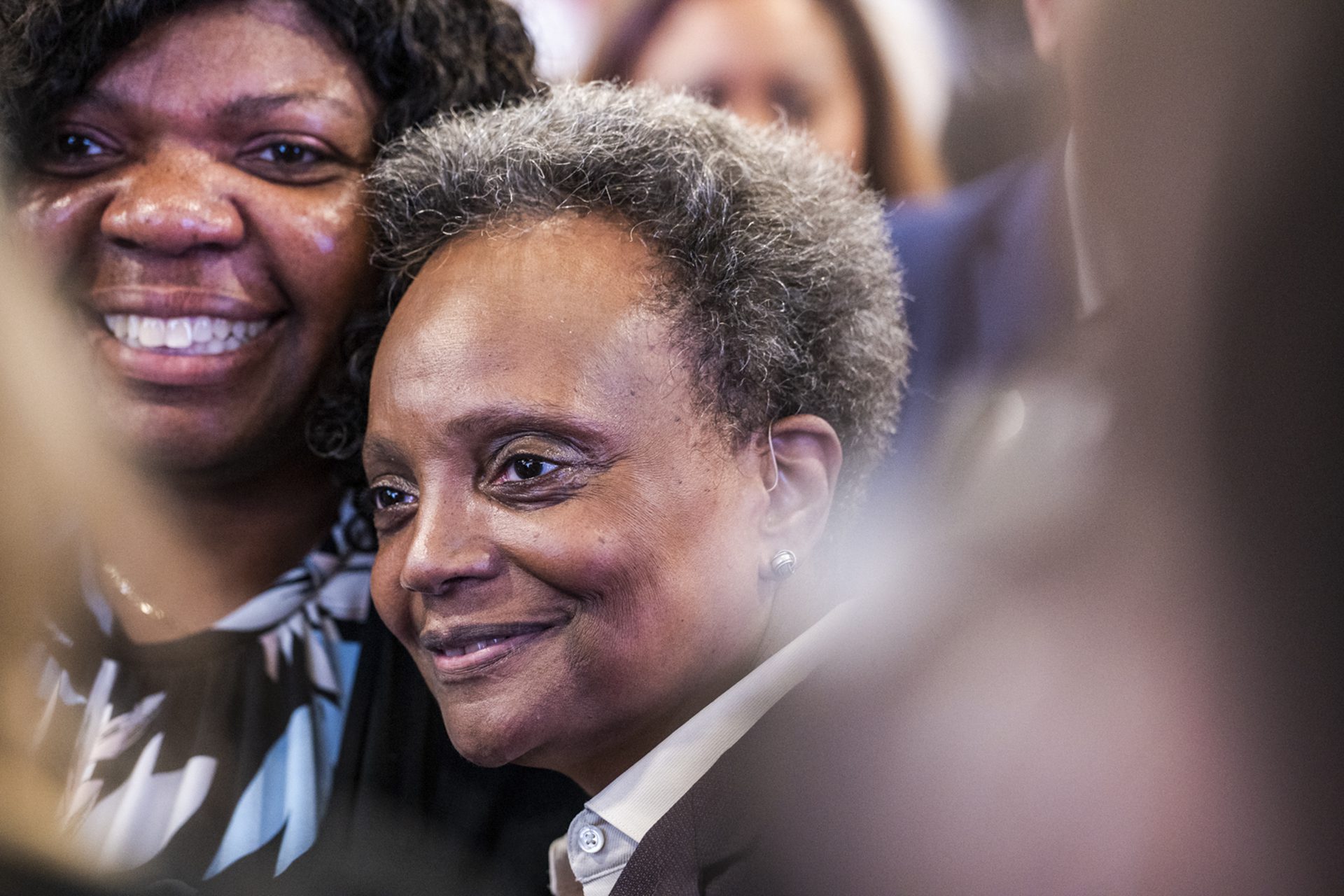
‘We’re People, Too, And Should Be Treated As Such’
At the Englewood (7th) District Police Station, 1438 W. 63rd St., Alejandra and Onil sat on a blanket on the floor as their 5-year-old son played with Legos.
Stacks of luggage and bags of food and toiletries were arranged neatly around them, separating the family from seven other migrants sitting or laying down on the police station’s floor with their belongings.
The family is from Venezuela and made the seven-month-long trek to the United States to give their child a chance at a better future, said Alejandra, who asked to only use her first name.
“In Venezuela you can study and study, but you still won’t have opportunities for a good life there. And I didn’t want that for my son,” she said in Spanish. “I want my son to have opportunities and a future here.”
Monday was the family’s first day at the Englewood station, but it’s the third police station they’ve shuffled between since arriving in Chicago 10 days ago from the Texas border, Alejandra said. The family arrived at the Mexico-U.S. border in March and waited in Juarez until they heard they could try to cross over, she said.
“We’re just here for opportunities. We’re people, too, and should be treated as such,” Alejandra said.
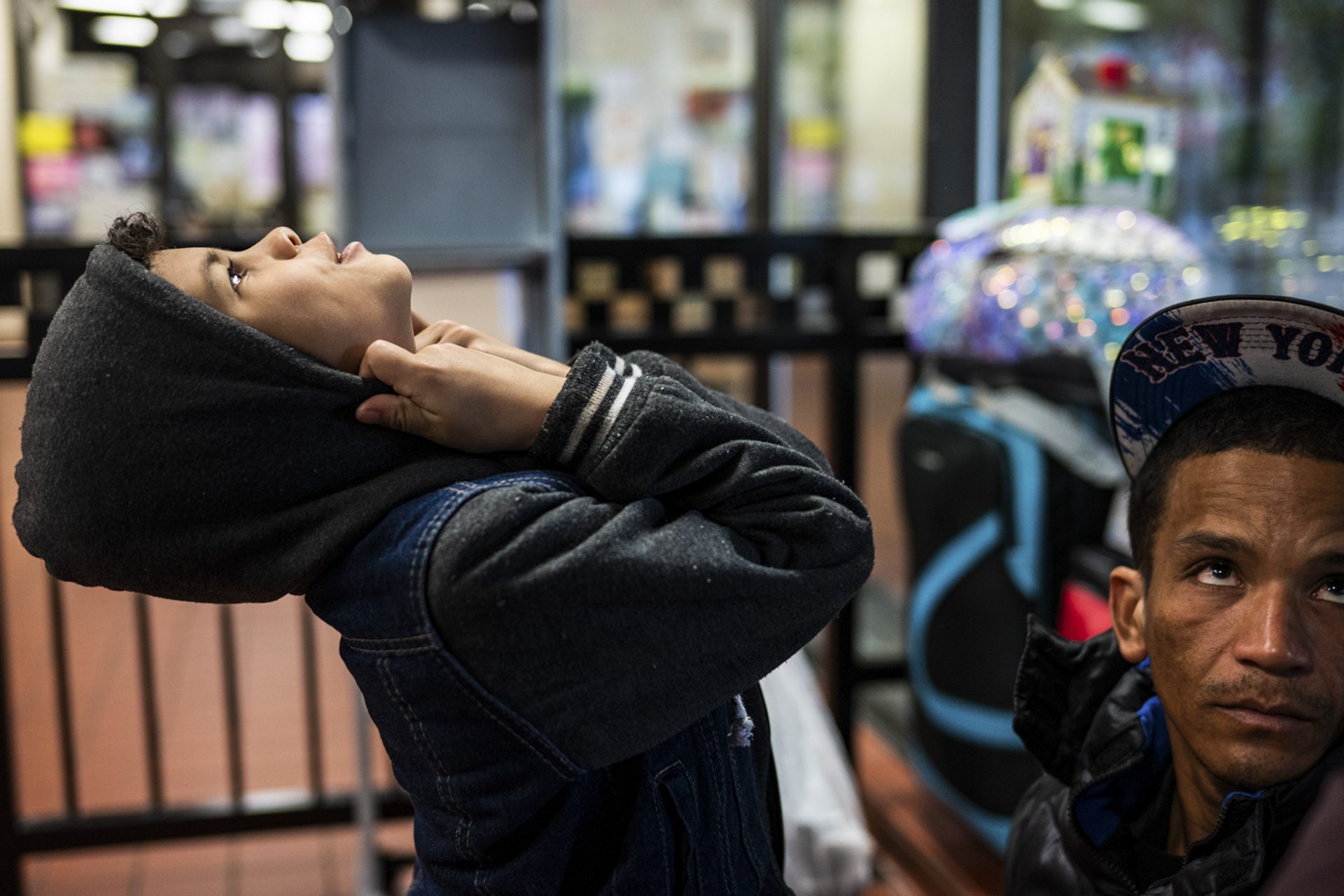
As of Monday, Carlos Edwardo Lugo Martinez was one of the 50 people living on the floor of the Near West (12th) District police station, 1412 S. Blue Island Ave. in Pilsen.
Martinez and a group of migrants waited outside the police station for a delivery of donated clothes, food and toiletries early Monday evening. While waiting, they discussed the migrants killed Sunday when a driver hit 18 people at a bus stop outside a migrant center in Brownsville, Texas, scouring for more information on what happened.
Martinez said Jorge Luis Flores, one of the migrants who was killed, was a friend of his.
“We were from the same city in Venezuela and we both came up north. We took different paths up here, but we both decided to make the trip. His family was inside the shelter, thankfully, when the driver hit Jorge and other people on the street,” Martinez said in Spanish.
Martinez has a wife and four small children back in Venezuela and came to the United States to find construction work in Chicago, he said. He’d heard how difficult the journey north could be, so he went alone with hopes to send for his family once he was settled, he said.
He was robbed while crossing the jungle near the Darien Gap and again in Mexico, Martinez said.
He’s been in Chicago for six days and only recently got a cell phone, but he still needs needs to walk to a nearby plaza to get free Wi-Fi, so he hasn’t been able to update his family as much as he wants, he said.
A migrant at the police station shared photos with Block Club via WhatsApp of families sheltering inside the enclosures of the building’s revolving doors. Officers were not allowing more people inside, he said.
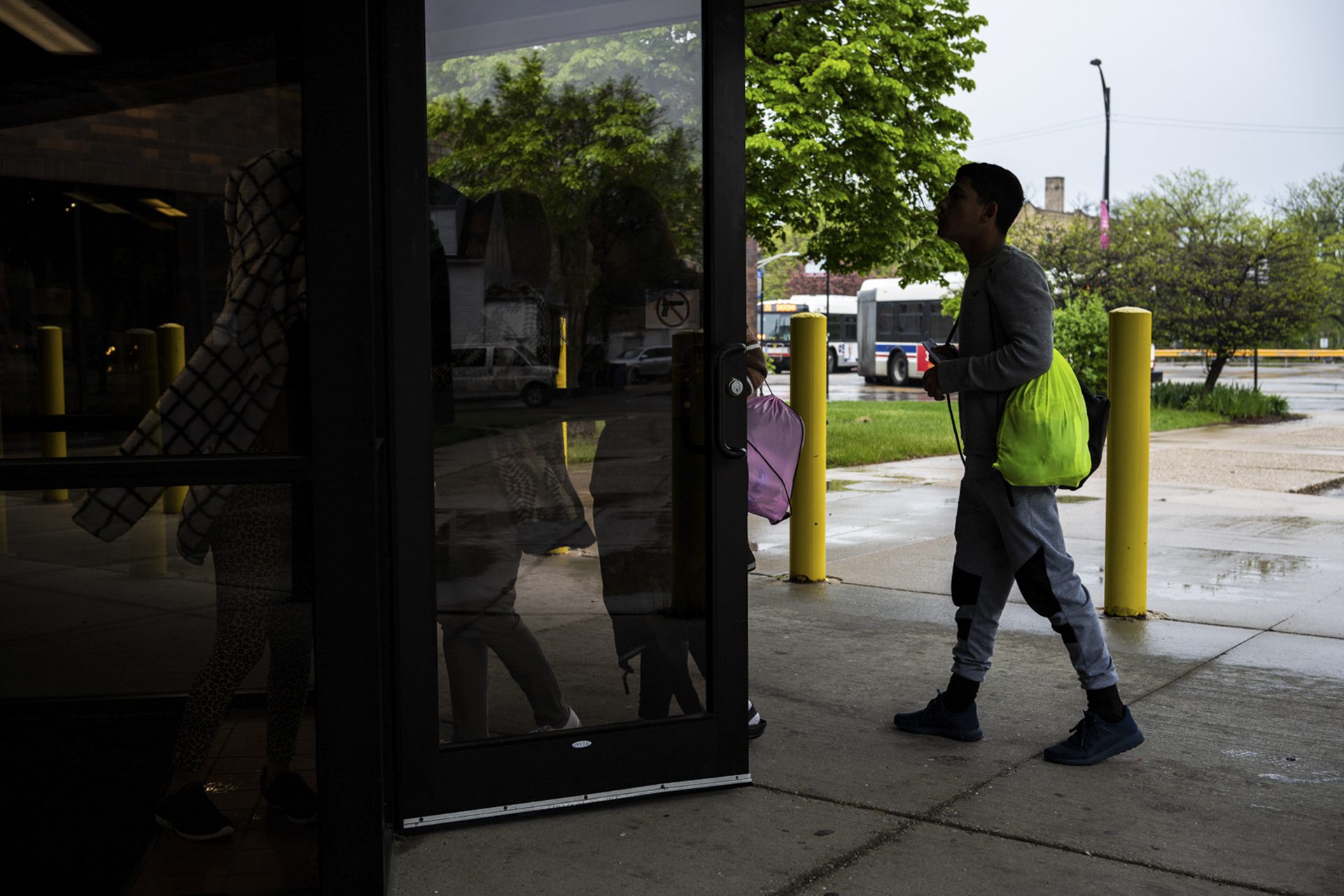
In Rogers Park, husband and wife Roíbel Torcat and Leonelis Garcia were directed to the neighborhood’s police station when they arrived in Chicago Thursday. The two traveled for nearly eight months from Venezuela with their two children, Sebastián González, 6, and Zoe Torcat, 4.
A group in San Antonio, Texas, gave the family free plane tickets to Chicago, Garcia said. Her sister is also in Chicago staying at a shelter, but she wasn’t sure where, she said.
Volunteers bring food and other assistance to the police station every day, but staying there for days is difficult, Garcia said.
“On the topic of food and people, we are doing well, thanks to God,” Garcia said in Spanish. “The only thing is that it’s cold and we’re all together sleeping on the floor, and the floor is hard. But we’re doing well, and where there’s life, there’s hope.”
While the adults grabbed food and snacks from boxes being dropped off Monday afternoon, Sebastián and Zoe played among themselves with some of the other children staying at the police station.
Garcia said her kids are doing well in the city and hopes to find school opportunities for them soon.
“The priority is to get them started studying, and for us to find jobs so we can get ahead and be able to provide a future for them,” she said. “We’re looking for a better life. Venezuela isn’t in good condition for anyone.”
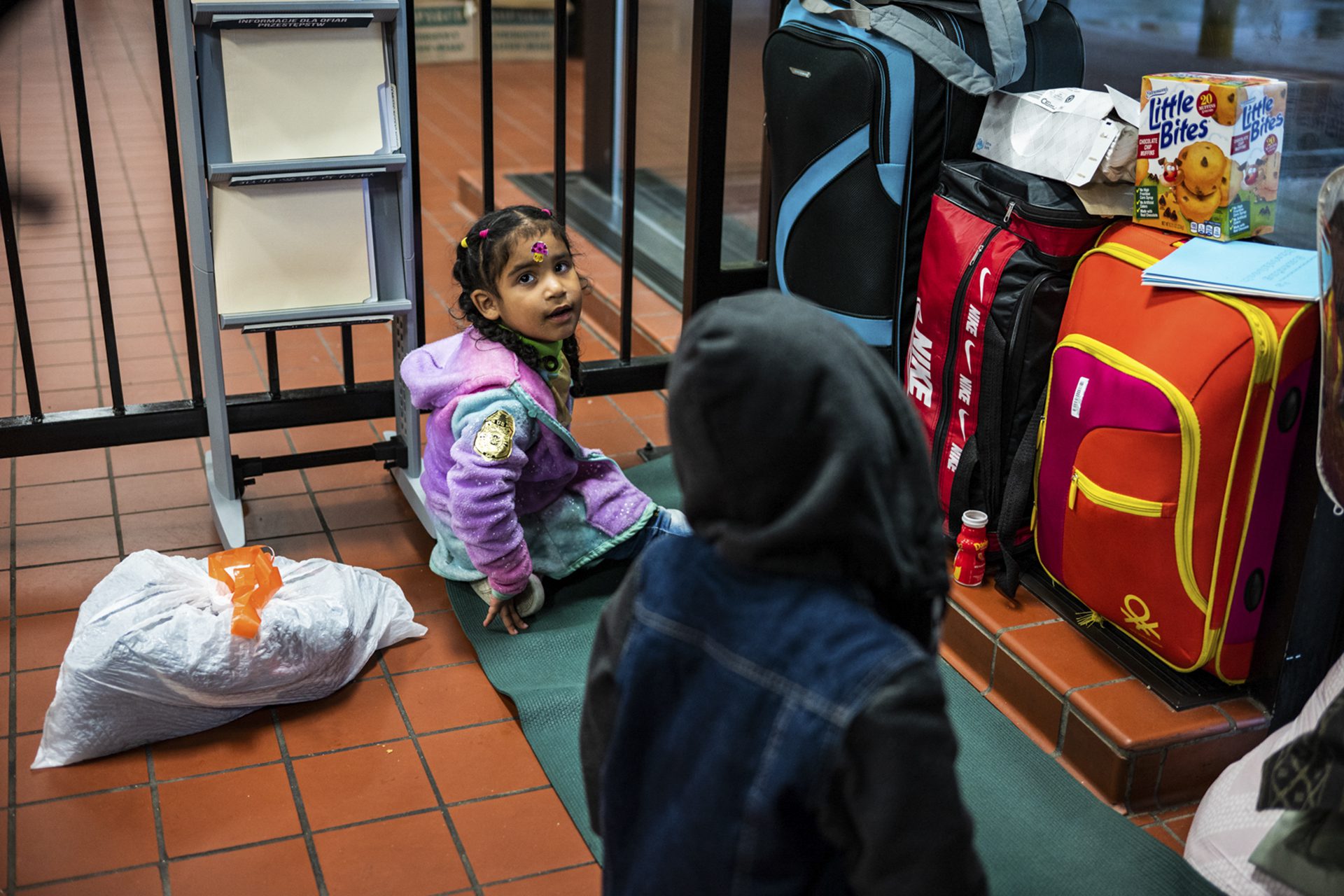
Leonardo Martinez and his brother are also staying at the Rogers Park police station, where they’ve slept on the floor since Friday.
Leonardo Martinez said it took them 45 days to journey from his hometown in Colombia to Piedras Negras, Mexico and cross the border into Texas. He was shuffled through detention centers and shelters for nearly a month before a local organization gave him a free ticket to Chicago, he said.
When they arrived, Leonardo Martinez and his brother were told the city’s shelters were full and they would have to wait days, maybe weeks, for space to open up, he said. The two have been staying at the police station since they arrived Friday morning.
“The locals here have helped us so much,” Leonardo Martinez said in Spanish. “They gifted us blankets, pillows, and they’re always bringing us food. A church nearby is allowing us to use their bathrooms to shower.”
Leonardo Martinez said he’s grateful for the assistance, but it’s difficult staying at the police station long term.
“We don’t have beds,” he said. “Children are sleeping on the floor. It’s a little inhumane because the floor is very cold, we don’t have a nearby bathroom. It’s difficult to arrive to a city where you don’t know anyone, and the language is complicated.”
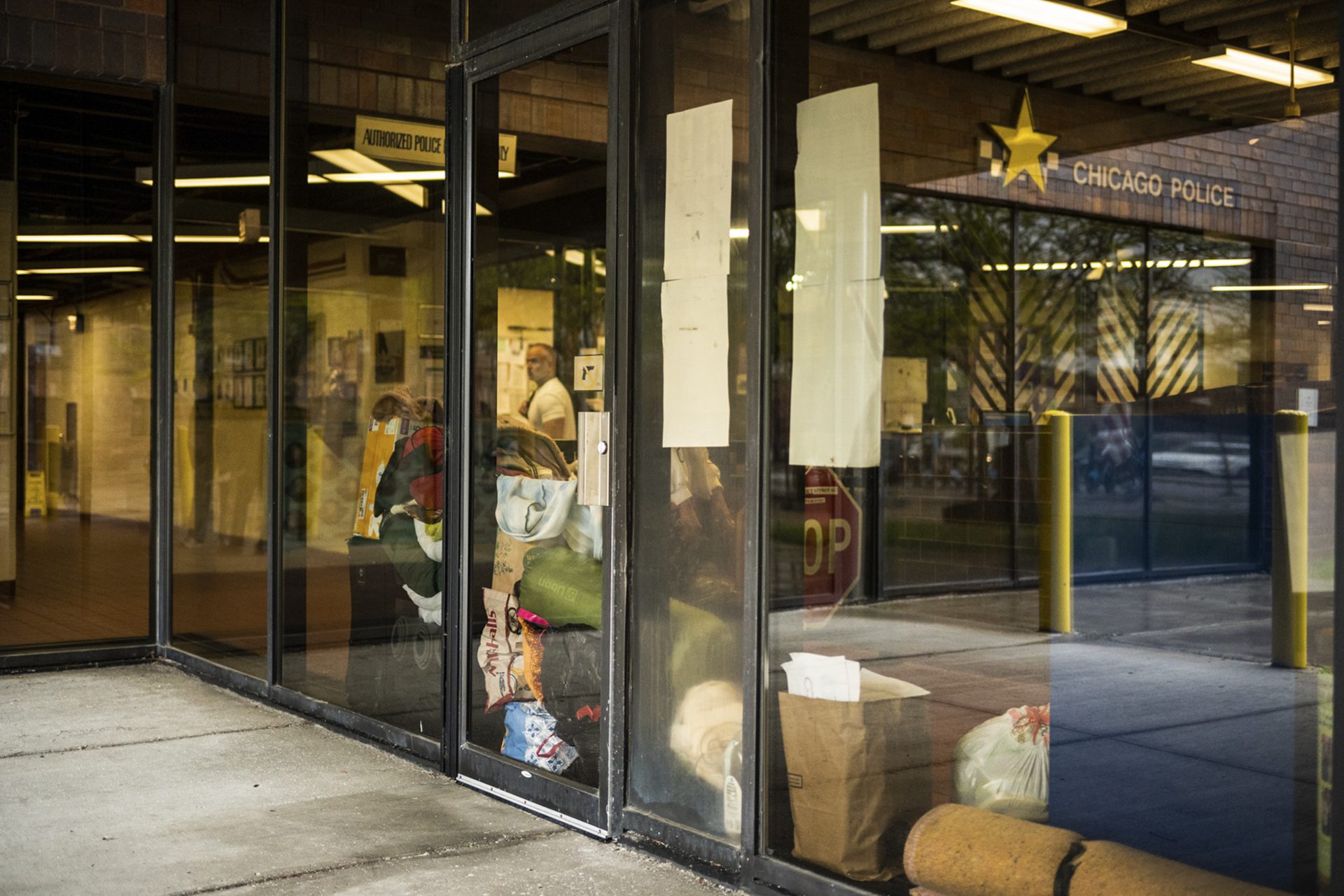
Officials Plea For State And Federal Help: ‘It Just Can’t Be All Thrown On Chicago’
City officials have been scrambling to find public facilities to house new arrivals for weeks.
When more migrants began to arrive in Chicago earlier this spring, most of Chicago’s emergency shelters were already at capacity and struggling to address the city’s existing homelessness crisis, officials said at a City Council committee hearing last month.
“We are using every tool in our toolbox to meet this growing crisis,” Brandie Knazze, commissioner of the Department of Family and Support Services, told alderpeople. More than 10 city employees were “detailed” to helping the arriving families, Knazze said.
At the 14th Police District in Logan Square, around 20 people are sleeping on the floor in the building’s lobby, Sgt. Mike Edens said.
If that number drops on a given day, more migrants are brought there to relieve overcrowding from neighboring stations, he said.
“They kind of move people around a little bit, so not just one district is feeling the burden,” he said.
Read More of Our Coverage
The Brands Park fieldhouse in Avondale will also soon be converted into a temporary shelter for asylum seekers. Spring programs at the park are being moved to accommodate for the shelter.
Ald. Rossana Rodriguez-Sanchez (33rd), whose ward includes the fieldhouse, said the city is responding in real time to the unfolding crisis.
Some parents whose kids are enrolled in park programs said they should’ve been notified about the plan ahead of time, but Rodriguez-Sanchez roundly rejected that line of criticism.
“This is not a plan that has been going on for six months. Nobody was blindsided. We are all doing everything we can as things come to us,” Rodriguez-Sanchez said.
“I wish that we had other structures of care, but the reality is that for decades we have not been building those, so all we have are police stations [and Park District facilities]. That’s all we have right now.”
The city is also exploring closed public school buildings to house migrants, including the old South Shore High School, 7627 S. Constance Ave. Up to 500 migrants at a time will receive short-term, basic amenities at the school, which could open as soon as this week, officials said last week.
But the proposal has garnered fierce criticism from South Shore neighbors which boiled over in a contentious meeting Thursday.
Many blasted the city for closing schools in Black neighborhoods, slow or nonexistent police responses and demanded more services for people experiencing homelessness who have been in Chicago for years.
“While we recognize this is a humanitarian crisis [that] may constitute an emergency for the city of Chicago, it does not constitute an emergency for the South Shore community nor the residents of the 8th Ward,” Ald. Michelle Harris said to start the meeting.
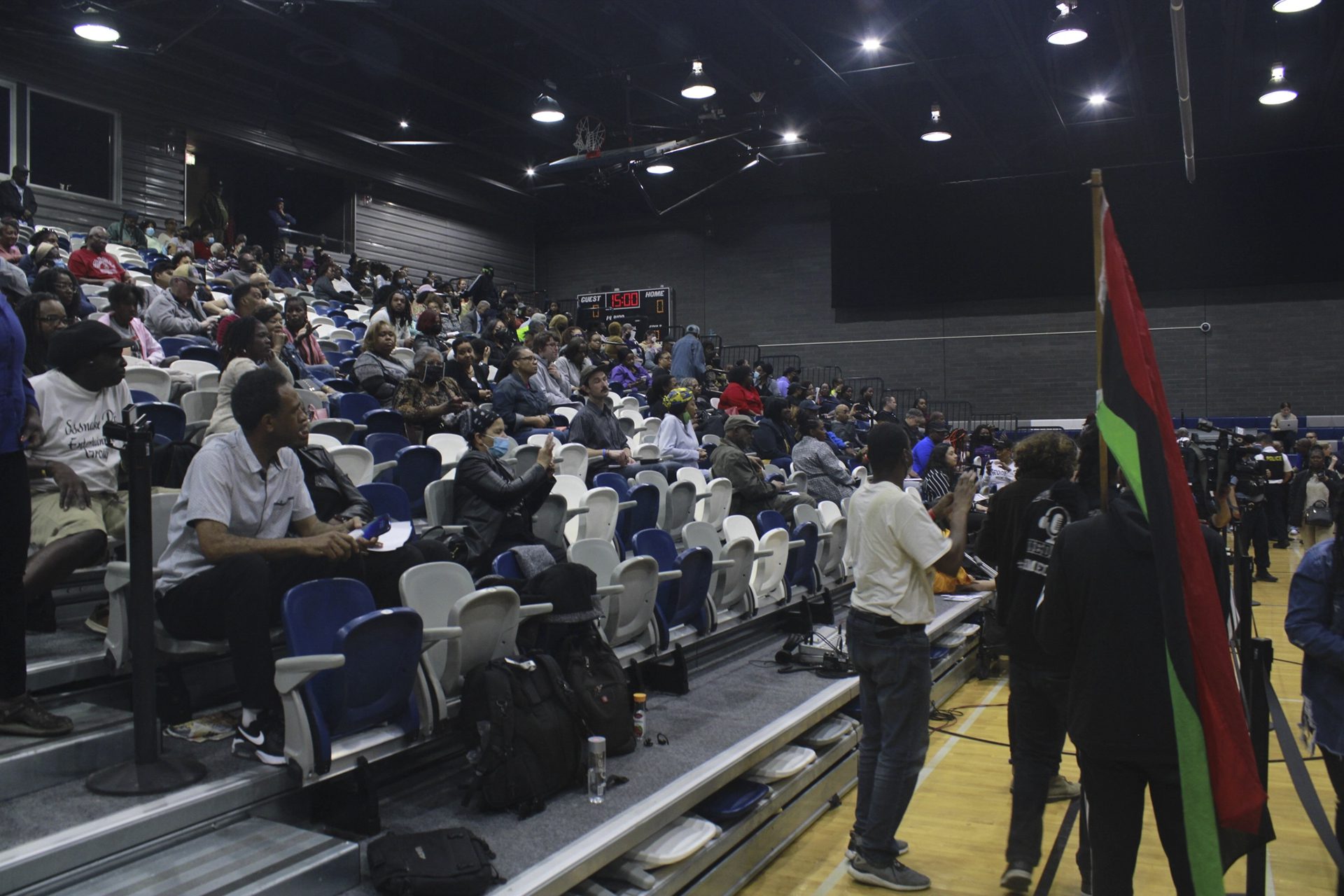
Other alderpeople Monday criticized the city and state response to the unfolding crisis. Ald. Brian Hopkins (2nd) suggested that National Guard armories around the city could be good sites to temporarily house migrants.
“There really isn’t a single element of this response that’s adequate,” Hopkins said.
Hopkins and Ald. Gil Villegas (36th) said immediate relief from state and federal authorities was needed to help Chicago bear the brunt of the migrant surge, instead of having to “piecemeal it together every time another bus pulls into the city limits,” Hopkins said.
Villegas said state and federal officials should help coordinate where migrants are housed, and other cities and towns in Illinois should be asked to pitch in.
“We’re not only a sanctuary city, we’re also a sanctuary state. So it’s 102 counties within the state of Illinois. And so we need the state government to step up, as well, and partner in this situation,” he said. “It just can’t be all thrown on Chicago.”
Read More of Our Coverage
Asked for comment, a spokesperson for Johnson referred a reporter to a statement from the Mayor-elect Friday.
“The truth of the matter is that we have governors around the border who have demonstrated they are not open to collaborating, and that of course is a disappointment,” the statement read. “I’m prepared to have conversations with everyone — particularly those who have used this as a weapon against cities — because asylum seekers are experiencing extremely difficult conditions, both emotionally and physically.”
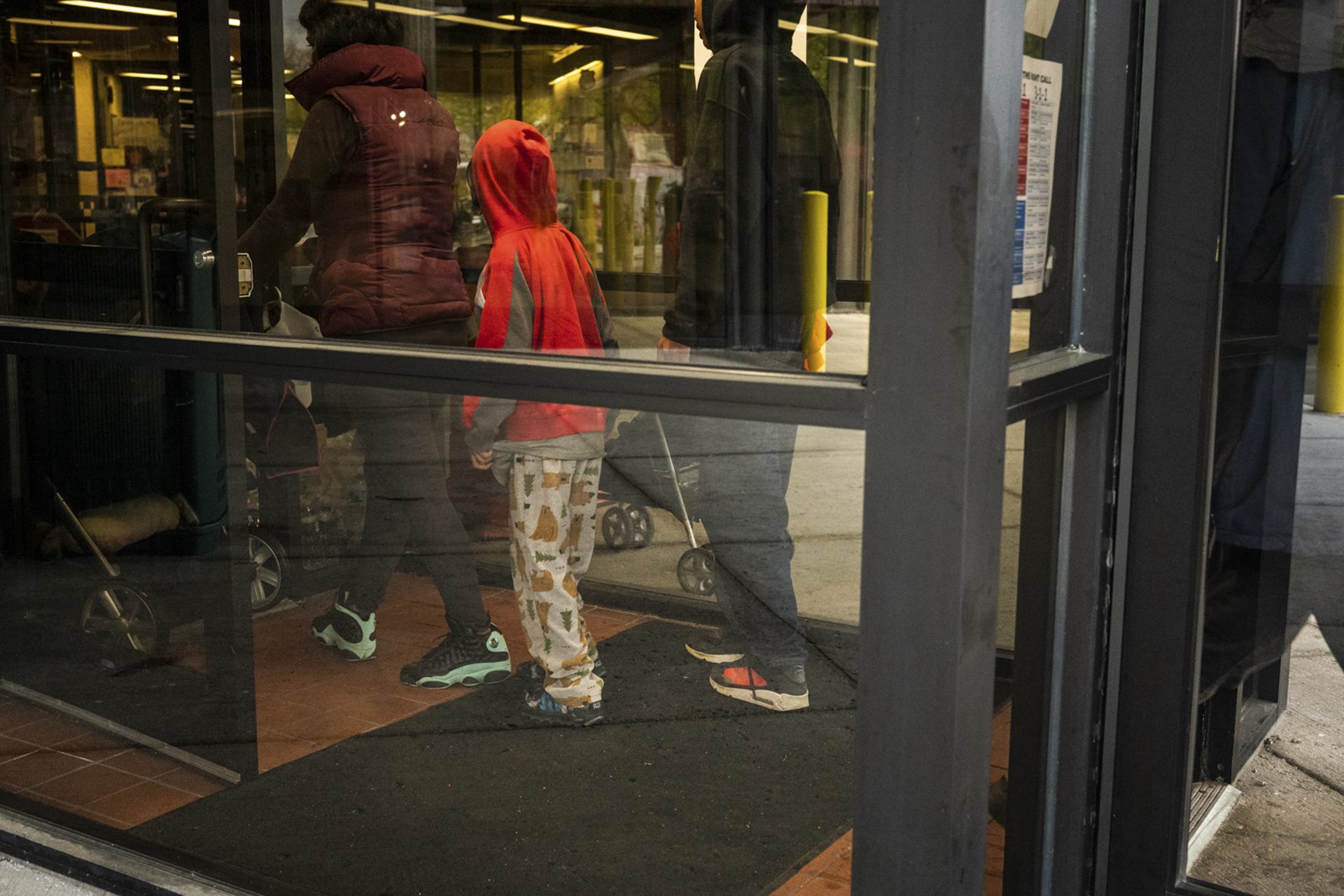
Neighbors Step In To Help People In Need
Without a comprehensive citywide response, neighbors are stepping up to help migrants.
In the 33rd Ward, about 100 residents have teamed up to bring hot meals and other basic supplies to migrants sleeping on the floor at the Albany Park (17th) Police District station.
Organizer Eric Ramos, also Rodriguez-Sanchez’s ward superintendent, said they have a system where they trade off preparing and delivering meals for breakfast, lunch and dinner.
Read More of Our Coverage
Volunteers have also connected families with medicine and medical care, Ramos said.
“There’s been a movement in Chicago that’s been very intentional in developing a culture around working together to solve problems, especially in moments of crisis,” Ramos said. “We got really good at it during the pandemic, and those same infrastructures that we built back then are still around and we’re able to … respond even faster.”
Ramos said city officials should be doing more to connect families with basic needs, a sentiment shared by other volunteers.
“It seems like it’s been left up to the communities to figure that out. It’s been amazing to see the Chicago community get better and better at it, but ultimately, we need systems in place that can handle these things,” he said.
On the South Side, organizer and former aldermanic candidate Tim Noonan runs a similar operation at the Morgan Park (22nd) Police District. Noonan’s group of about 30 volunteers is helping deliver meals to families daily, serving about 20 migrants as of Monday, he said.
Officers at the station were initially resistant to the idea, but eventually had a “change of heart” and allowed them to make daily deliveries and set up a snack table, Noonan said.
“We gotta do what we can do to make sure they’re, for one, welcomed, and can get basic needs,” Noonan said.
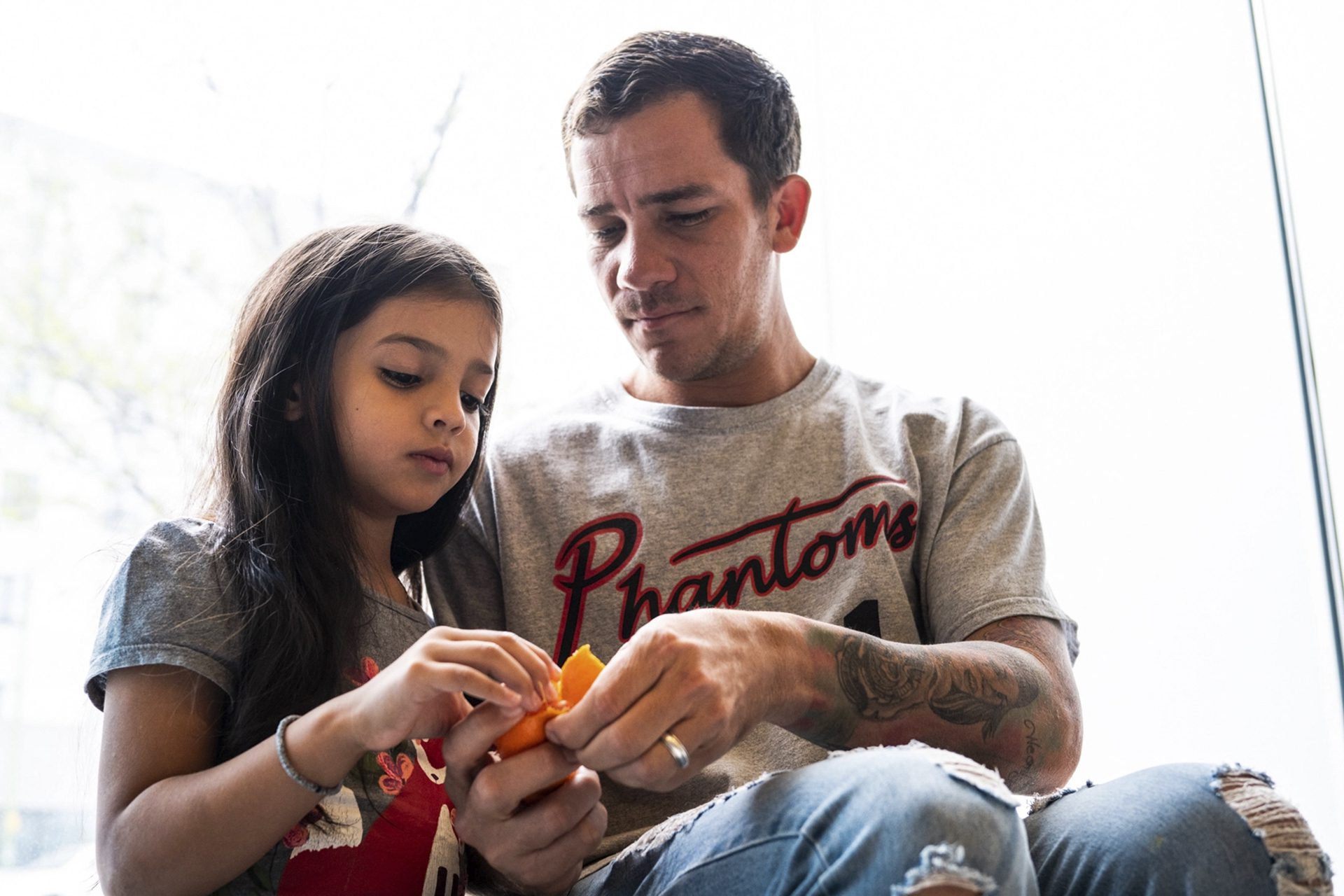
Edens, of the 14th Police District, said the station has seen overwhelming support and donations from neighbors and elected officials. Anyone interested in helping migrants staying in the district can email [email protected].
Villegas and Hopkins said they were impressed and heartened by the outpouring of support — and Villegas recommended checking in with aldermanic social media accounts to learn how to help migrants in need.
“It’s encouraging to see average citizens in Chicago really taking the welcoming city concept and taking responsibility for it, because the city was just woefully unprepared for this,” Hopkins said.
At the Englewood police station Monday, Alejandra said despite the uncertainty of her family’s living situation, she’s grateful they made it from Venezuela to the United States without being robbed or worse, she said.
“I’m just so grateful that we’re together and safe here,” she said.
Her main goals are to secure a more private living situation for her family, getting permission to work, finding a job and learning English, she said.
Once the family is settled, Alejandra also plans to send money to family still struggling back home in Venezuela, she said.
“We came here to work,” she said.
Block Club Chicago’s Maxwell Evans, Mack Liederman, Melody Mercado and Mick Dumke contributed.

Bring power to immigrant voices!
Our work is made possible thanks to donations from people like you. Support high-quality reporting by making a tax-deductible donation today.
